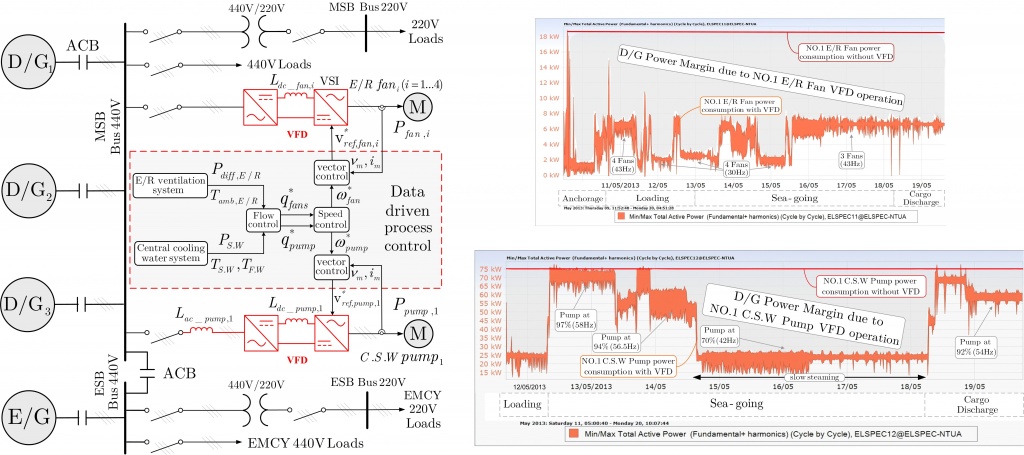PhD Thesis Final Defense to be held on 1st March, 2018 in the premises of the Central Library of NTUA at 13:00
The examination is open to anyone who wishes to attend.

Thesis Title: Development of a data-driven process control topology with Variable Frequency Drives for power saving and reduction of generator fuel consumption in marine vessels
Abstract
In this thesis, a robust data-driven control topology is developed, involving the optimal speed control of motors associated with processes related to ship’s main engine (Μ/Ε) and auxiliary machinery operation. The flow requirements of these processes are dynamically changing according to the vessel’s operational profile. The proposed topology leads to improvement of power balance in the autonomous power system of marine vessels, optimizing energy management as well as diesel generator (D/G) fuel consumption and operating profile, especially during sea-going period. The initial point of study is the variation in vessel’s power balance due to application of slow steaming practice, involving the operation of ship’s main engine at low speed. Although this practice is commonly used nowadays to reduce M/E fuel consumption, it often leads to the use of an additional diesel generator engine in parallel to the operating one at low load resulting in higher specific fuel oil consumption. At the same time, an energy saving margin is created in the power system by the derated flow rate requirements in processes related to M/E and auxiliary machinery operation due to their variable cooling combustion air and heat dissipation needs. However, there is currently no advantage taken of this margin, since the motors associated with these processes operate constantly at their nominal power. The proposed topology involves adaptive speed adjustment of motors driving the cooling sea water pumps and the engine room fans in the vessel’s central cooling water system and engine room ventilation system respectively based on pressure and temperature feedback signals from the processes. This is performed according to process requirements, which dynamically change according to the vessel’s operating profile. The parameters of the proposed control system are self-tuned in real time based on data received from the processes, so that the motors driving the pumps and the fans respectively operate with optimal speed, allowing maximum power saving potential. Towards this goal, the controller ensures that the minimum allowable speed limits are dynamically adapted in relation to the changing cooling water and combustion air flow requirements of vessel’s M/E and auxiliary machinery. The design of the proposed topology is performed based on the parameters of typical tanker vessel with size of 105,000tons DWT, where the system is also implemented. The proposed adaptive data-driven control topology is realized through a commercial programmable logic controller (PLC), while a human-machine interface (HMI) is developed for plant parameter monitoring. The variable frequency control of motors is performed using indirect field oriented control with speed estimation based on model reference adaptive system technique, while pulse generation for the IGBTs of the 2-level inverter is performed using space vector PWM (SVPWM). To ensure that, after the application of the variable frequency drive (VFD) topology, the level of power quality at the point of common coupling (PCC) is maintained according to marine classification society regulations in the vessel’s autonomous power system, a systematic power quality assessment and monitoring methodology is proposed to dimension appropriate harmonic filters, considering the source short circuit capacity and the existing vessel’s power system harmonics. The proposed system is retrofitted in a typical tanker vessel and the obtained experimental results are compared to previous operating conditions in order to show how the achieved optimization of power balance and D/G operating profile affects the D/G fuel consumption. In this view, a method is proposed to calculate the economic and environmental benefits, based on the used fuel type, the specific D/G fuel consumption and the ship’s operating profile. The results show that the proposed system leads to reduction of annual energy consumption in the power system by 18.3% and to reduction of annual D/G fuel consumption by 20.3%, verifying the importance of the proposed energy efficiency upgrade for the maritime industry.
Supervisor: Manias Stefanos (Professor Emeritus)
PhD student: Giannoutsos Spyridon
